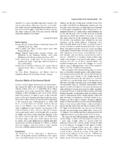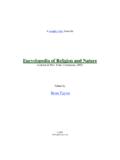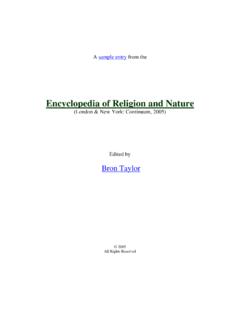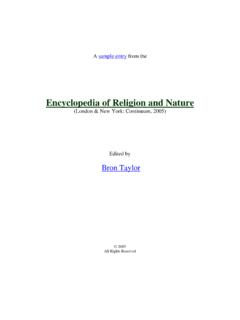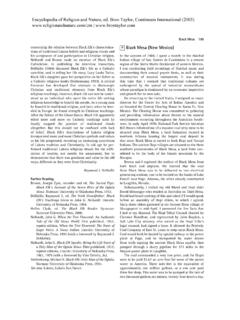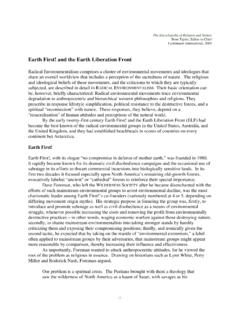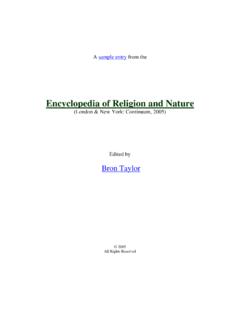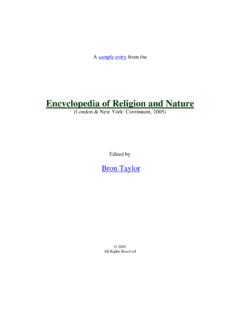Transcription of Encyclopedia of Religion and Nature
1 A sample entry from the Encyclopedia of Religion and Nature (London & New York: Continuum, 2005). Edited by Bron Taylor 2005. All Rights Reserved 1428 rousseau , Jean-Jacques Gottlieb. This Sacred Earth: Religion , Nature , and of books. He was apprenticed to an engraver, but he Environment. London: Routledge, 1996, 184 193. soon left, and was taken into the home of a Swiss baron- See also: Carson, Rachael; Nobel Savage; Religious ess, Madame de Warens, who became his patron and lover. Environmentalist Paradigm; Romanticism (various); Under her guidance rousseau converted to Catholicism, Thoreau, Henry David. enjoyed years of undisturbed study of philosophy and lit- erature, and grew in his appreciation for the beauties of Nature .
2 At the age of thirty he moved to Paris, developed a rousseau , Jean-Jacques (1712 1778) close friendship with Denis Diderot (1713 1784), the pantheistic French philosopher, and met many other Jean-Jacques rousseau , a leading Enlightenment thinker, philosophers. He achieved notoriety in 1750 with the pub- was perhaps most famous for his appeal to the state of lication of his essay, Discourse on the Arts and Sciences, Nature as an ideal in whose light the general distortions which sparked controversy by arguing that progress in the of modern society could be measured and remedies arts and sciences distorted human life by pulling us away proposed.
3 rousseau was a passionate critic of what he from the essential goodness, contentment, and virtues perceived to be the arti ce, false consciousness, and found in the state of Nature . This argument clashed with inequality of modern society, and he advocated strongly a central assumption of the Enlightenment, namely, that the need to recover natural feeling, virtue, natural com- progress in reason and science directly promotes human passion, freedom, and equality. He placed such trust in well-being and moral virtue. After publishing a Discourse Nature because he trusted Nature 's God. on Inequality (1755) that developed his account of societal Born a Calvinist, rousseau converted to Catholicism as evolution, rousseau moved out of Paris to the country a young man, and later adopted deist views rejecting home of a benefactor.
4 There in rapid succession he wrote revealed Religion in favor of natural Religion based on his masterworks: Julie, or the New Heloise (1761); Emile, the evidence of God's existence that reason discerns in the or On Education (1762), and The Social Contract (1762). wondrous order and harmony of the system of Nature . He The rst, a novel about romance and love and their con- elaborated in detail an educational agenda aimed at pro- ict with duty, became the most widely read work of c- tecting the natural feelings and growing virtue of young tion in France for a number of years. The second became a people by having them rst engage the challenges and recognized classic of educational philosophy.
5 The Social constraints posed by the natural environment, rather than Contract became a landmark of political theory. Its stress the alienation, prejudice, and competitiveness thrust at on popular sovereignty and freedom gave voice to aspira- them by society. During his last years of life, he turned for tions that anticipated the ideals of revolutionary France. comfort to the study of botany and to walking in the coun- Many critics, however, noted the irony that rousseau , who tryside. His last book, Reveries of a Solitary Walker (1782) could not tolerate the demands of family life and aban- described ecstatic periods of direct contemplation of the doned his ve children to a public orphanage, could write great pageant of creation.
6 This work was widely read so eloquently of love, personal duty, and the importance of and gave impetus to the Romantic Movement's general children's upbringing. reverence of the Nature and celebration of natural feeling. rousseau 's fullest account of his views on Religion is rousseau was a watershed gure of the eighteenth century found in Emile, in a section titled the Profession of Faith whose writings did much to popularize a growing sense of of the Savoyard Vicar. In it the Vicar explains that when reverence for Nature . we ponder the marvelous order, harmony, and motion of rousseau followed the lead of classic Christian theo- the physical universe we can only conclude that there logians and deist thinkers in seeing proof of God's exist- exists a rational and benevolent power who wills this uni- ence in the harmony, order and motion of the system of verse into existence and sets things in motion.
7 As he says: Nature . rousseau drew on Christian and deist views I perceive God everywhere in His works. I sense Him in regarding God's providential dominion over the world and me; I see Him all around me ( rousseau 1979a: 277). As on humanity's fall, combining these into a powerful nar- God is good, so is all God's creation, including humanity rative of original goodness, societal corruption, and pro- itself. Religious belief thus provides rousseau with basic posed paths of recovery and renewal. He broke with the con dence for trusting Nature 's goodness and purity. Christian notion of original sin and located the Fall not in rousseau thus af rms the essential goodness of humanity human Nature , but in human history.
8 Armed with these even while stressing the history of human corruption. As themes of creation and Fall, rousseau could launch a he put it in the opening of Emile: Everything is good as it harsh indictment against societal alienation and injustice leaves the hands of the Author of things; everything and still af rm hope in humanity's fundamental goodness degenerates in the hands of man ( rousseau 1979a: 37). and potential. For rousseau , the path out of societal sin lies not in Born and raised in Geneva, rousseau received no for- some special divine grace, but rather in recovering our mal education, but his father gave him a love of Nature original goodness.
9 Rubber and Religion 1429. Both Emile and The Social Contract were condemned in mals who enjoy the right not to be needlessly mistreated . Paris and Geneva by religious and political authorities ( rousseau 1988: 7). who viewed the books as subversive. rousseau ed France In addition rousseau 's analysis offers insight into some and lived for a number of years at the mercy of bene- of the contemporary societal dynamics that increase eco- factors. Anxiety ridden and often paranoid, he worked on logical degradation. For example, his understandings of his Confessions and retreated into the solace of the botani- inequality and how it shapes social structures and psycho- cal studies and countryside walks.
10 His Reveries, published logical dynamics shed light on forces that promote over- posthumously, describe him as feeling rejected by friends consumption and ecological degradation. Similarly, his and society and yet experiencing a sense of peace and critique of education anticipated the concerns of ecologic- contentment arising from a sustained contact with Nature ally concerned people who fear that modern advertising and its simple plant life. Walks in which he observed the promotes unsustainable lifestyles. rousseau 's suspicion of great pageant of Nature gave him a sense of the unity of socially in ated wants and his af rmation of the simple, all things.
